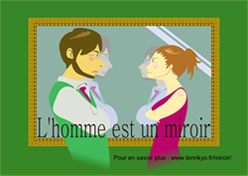Teaching of Tenrikyo
Dusts of the Mind
Through the metaphor of dust, God the Parent teaches us about the misuse of the mind, the use of the mind not in accord with God's will.
Particles of dust are so light and minute that they can be blown away by a single puff of breath. However, dust accumulates quickly and, if we are negligent, it can pile up so high that the cleaning will become very difficult no matter how hard we attempt to sweep or wipe it away. Our minds, which we are allowed to use freely, will likewise become clouded if we use them in a selfish way, which does not accord with the will of God the Parent. In due course, we will be unable to understand the divine will or receive God's blessings. Dusts accumulated in the mind appear as illness and troubles.
As a means to help us reflect on the dusts of the mind and sweep them away, God the Parent cited eight: miserliness, covetousness, hatred, self-love, grudge-bearing, anger, greed, and arrogance. In addition, God the Parent warns us that God "dislikes falsehood and flattery."
When we understand the truth of the teachings and use that as the standard to correct our use of the mind, our minds will become clear and our bodies refreshed. This sweeping of the mind is accomplished with "God as the broom."
The eight dusts
Miserliness
The dust of miserliness is to begrudge giving our services; to begrudge paying an imposed charge; to begrudge fulfilling our social responsibilities; to begrudge returning things borrowed; and to begrudge doing one's share of work while imposing it on others.
Covetousness
The dust of covetousness is to enviously crave for money without making any effort to earn it; to desire good clothes or good food beyond one's means; and to desire more things, knowing what we have is enough.
Hatred
The dust of hatred is to take offense at someone's advice given in good faith and hate this person; to hate our in-laws; to slander and ridicule others behind their backs; and to condemn not the offense but its perpetrator.
Self-love
The dust of self-love is to care only about ourselves, forgetting others; to be so attached to our children as to allow them to make unreasonable demands about food or clothes and play when they should be doing chores; to dote on our children so much as not to correct their behavior; and to speak badly of others in an effort to defend our egos.
Grudge-bearing
The dust of grudge-bearing is to bear a grudge against others, claiming someone has caused us to lose face or kept us from gaining what we desire; to bear ill will because of something said; and to hold a grudge against someone without looking at our own lack of merit.
Anger
The dust of anger is to become angry when someone has said unpleasant things about us or done something contrary to our expectations; and to feel anger at others' refusal to accept our point of view when we unreasonably insist on our own opinion rather than trying to understand theirs.
Greed
The dust of greed is to want to have more of everything; to make profits by cheating or giving someone short measure; to steal or misappropriate what belongs to others; and to succumb to lust.
Arrogance
The dust of arrogance is to be puffed up with self-importance; to be domineering; to look down on others by abusing our wealth or power; to hold others in contempt by boasting that we are knowledgeable; to find fault with others; and to pretend to know what we really don't.
from Yoboku's Guide to Tenrikyo, translated by Tenrikyo Overseas Department
 English
English Español
Español Français
Français 日本語
日本語